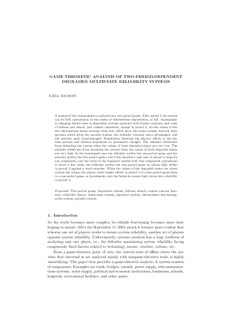| dc.contributor.author | Hausken, Kjell | |
| dc.date.accessioned | 2013-08-16T08:02:04Z | |
| dc.date.available | 2013-08-16T08:02:04Z | |
| dc.date.issued | 2011 | |
| dc.identifier.citation | Hausken, K. (2011) Game theoretic analysis of two-period-dependent degraded multistate reliability systems. International Game Theory Review, 13(3), pp. 247-267 | no_NO |
| dc.identifier.uri | http://hdl.handle.net/11250/184317 | |
| dc.description | Game Theoretic Analysis of Two Period Dependent Degraded Multistate
Reliability Systems, Kjell Hausken, International Game Theory Review, vol. 13(3). Coyright 2011, with permission from World Scientific Publishing Co. Pte. Ltd. http://www.worldscientific.com/worldscinet/igtr | no_NO |
| dc.description.abstract | A system of two components is analyzed as a two-period game. After period 1 the system can be fully operational, in two states of intermediate degradation, or fail. Analogously to changing failure rates in dependent systems analyzed with Markov analysis, unit costs of defense and attack, and contest intensities, change in period 2. As the values of the two intermediate states increase from zero which gives the series system, towards their maxima which gives the parallel system, the defender becomes more advantaged, and the attacker more disadvantaged. Simulations illustrate the players' efforts in the two time periods and utilities dependent on parametric changes. The defender withdraws from defending the system when the values of both degraded states are very low. The attacker withdraws from attacking the system when the values of both degraded states are very high. In the benchmark case the defender prefers the one-period game and the attacker prefers the two-period game, but if the attacker's unit cost of attack is large for one component, and the value of the degraded system with this component operational is above a low value, the defender prefers the two-period game to obtain high utility in period 2 against a weak attacker. When the values of the degraded states are above certain low values, the players exert higher efforts in period 1 of a two-period game than in a one-period game, as investments into the future to ensure high versus low reliability in period 2. | no_NO |
| dc.language.iso | eng | no_NO |
| dc.publisher | World Scientific Publishing Co. Pte. Ltd. | no_NO |
| dc.subject | dependent system | no_NO |
| dc.subject | defense | no_NO |
| dc.subject | attack | no_NO |
| dc.subject | contest success function | no_NO |
| dc.subject | reliability theory | no_NO |
| dc.subject | multi-state system | no_NO |
| dc.subject | degraded system | no_NO |
| dc.subject | intermediate functioning | no_NO |
| dc.subject | game theory | no_NO |
| dc.subject | parallel system | no_NO |
| dc.title | Game theoretic analysis of two-period-dependent degraded multistate reliability systems | no_NO |
| dc.type | Journal article | no_NO |
| dc.type | Peer reviewed | no_NO |
| dc.subject.nsi | VDP::Social science: 200 | no_NO |
| dc.source.pagenumber | 247-267 | no_NO |
| dc.source.volume | 13 | no_NO |
| dc.source.journal | International Game Theory Review | no_NO |
| dc.source.issue | 3 | no_NO |
| dc.identifier.doi | 10.1142/S0219198911002988 | |
